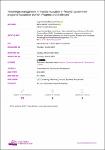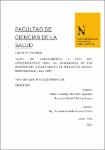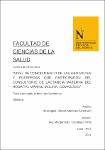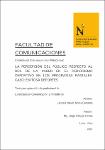Mostrar el registro sencillo del ítem
Knowledge management in financial education in Peruvian government programs focused on women: Progress and challenges
| dc.contributor.author | Machuca Vílchez, Jorge Antonio | |
| dc.contributor.author | Ramos Cavero, María Jeanett | |
| dc.contributor.author | Cordova Buiza, Franklin | |
| dc.date.accessioned | 2023-10-24T22:55:06Z | |
| dc.date.available | 2023-10-24T22:55:06Z | |
| dc.date.issued | 2023-04-20 | |
| dc.identifier.citation | Machuca, J. A., Ramos, M. J., & Cordova, F. (2023). Knowledge management in financial education in Peruvian government programs focused on women: Progress and challenges. Knowledge and Performance Management, 7, 1-14. http://dx.doi.org/10.21511/kpm.07(1).2023.01 | es_PE |
| dc.identifier.other | . | es_PE |
| dc.identifier.uri | https://hdl.handle.net/11537/34754 | |
| dc.description.abstract | In Latin America, the age group made up of women is at a disadvantage compared to men in terms of their economic empowerment, which is reflected in the lack of access to paid employment, their average wages are lower than those of men and their performance in poor quality jobs. In this context, the objective of this study is to analyze what aspects of knowledge are developed by the main government financial education programs focused on Peruvian women belonging to organizations (Comedores Populares Programs) or participants in a state social program (Juntos Program) in order to include them financially. The method used is documentary research that seeks to deepen the financial education proposals that the Peruvian government has provided in the last 10 years. The results show that the implementation of government programs increased the participation of women in financial education actions by 61%, achieving a significant improvement from 31% to 77% in the knowledge obtained by the beneficiaries in financial matters; and that, due to the poverty characteristics of the beneficiaries, there were limitations in access to digital media and the current programs are carried out in person. It was concluded that the knowledge management component of the programs should focus on economic empowerment and attitudes towards money and not only on practical knowledge of financial products and services; and that the State must implement policies to ensure that beneficiaries have access to technological equipment so that training uses digital resources and not only resources for face-toface training. | es_PE |
| dc.format | application/pdf | es_PE |
| dc.language.iso | eng | es_PE |
| dc.publisher | LLC CPC Business Perspectives | es_PE |
| dc.rights | info:eu-repo/semantics/openAccess | es_PE |
| dc.rights.uri | https://creativecommons.org/licenses/by-nc-sa/4.0/ | * |
| dc.source | Universidad Privada del Norte | es_PE |
| dc.source | Repositorio Institucional - UPN | es_PE |
| dc.subject | Attitudes | es_PE |
| dc.subject | Capabilities | es_PE |
| dc.subject | Economic empowerment | es_PE |
| dc.subject | Financial inclusion | es_PE |
| dc.subject | Juntos program | es_PE |
| dc.title | Knowledge management in financial education in Peruvian government programs focused on women: Progress and challenges | es_PE |
| dc.type | info:eu-repo/semantics/article | es_PE |
| dc.publisher.country | PE | es_PE |
| dc.identifier.journal | Knowledge and Performance Management | es_PE |
| dc.description.peer-review | Artículo científico | es_PE |
| dc.subject.ocde | https://purl.org/pe-repo/ocde/ford#5.02.04 | es_PE |
| dc.description.sede | Los Olivos | es_PE |
| dc.identifier.doi | http://dx.doi.org/10.21511/kpm.07(1).2023.01 |







